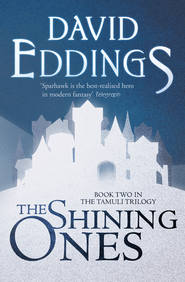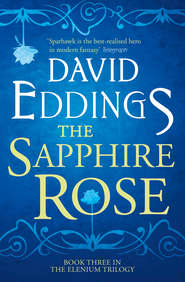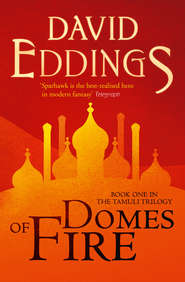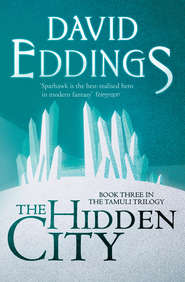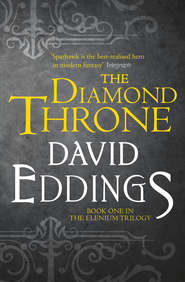По всем вопросам обращайтесь на: info@litportal.ru
(©) 2003-2025.
✖
Polgara the Sorceress
Автор
Год написания книги
2019
Настройки чтения
Размер шрифта
Высота строк
Поля
When at last I entered the shade of those wide-spread branches, a strange sort of warm glowing peace came over me and erased my trepidation. Somehow I knew that the Tree meant me no harm. I walked quite resolutely toward that vast, gnarled trunk.
And then I put forth my hand and touched it.
And that was my second awakening. The first had come when father had laid his hand upon my head in benediction, but in some ways this awakening was more profound.
The Tree told me – although ‘told’ is not precisely accurate, since the Tree does not exactly speak – that it was – is, I suppose – the oldest living thing in the entire world. Ages unnumbered have nourished it, and it stands in absolute serenity in the center of the Vale, shedding years like drops of rain from its wide-spread leaves. Since it pre-dates the rest of us, and it’s alive, we’re all in some peculiar way its children. The first lesson it taught me – the first lesson it teaches everyone who touches it – was about the nature of time. Time, the slow, measured passage of years, is not exactly what we think it is. Humans tend to break time up into manageable pieces – night and day, the turning of the seasons, the passage of years, centuries, eons – but in actuality time is all one piece, a river flowing endlessly from the beginning toward some incomprehensible goal. The Tree gently guided my infant understanding through that extremely difficult concept.
I think that had I not encountered the Tree exactly when I did, I should never have grasped the meaning of my unusual life-span. Slowly, with my hands still on the Tree’s rough bark, I came to understand that I would live for as long as necessary. The Tree was not very specific about the nature of the tasks which lay before me, but it did suggest that those tasks would take me a very long time.
And then I did hear a voice – several, actually. The meaning of what they were saying was totally clear to me, but I somehow knew that these were not human voices. It took me quite some time to identify their source, and then a rather cheeky sparrow flittered down through those huge branches, hooked his tiny claws into the rough bark of the Tree a few feet from my face, and regarded me with his glittering little eyes.
‘Welcome, Polgara,’ he chirped. ‘What took you so long to find us?’
The mind of a child is frequently willing to accept the unusual or even the bizarre, but this went a little far. I stared at that talkative little bird in absolute astonishment.
‘Why are you looking at me like that?’ he demanded.
‘You’re talking!’ I blurted.
‘Of course I am. We all talk. You just haven’t been listening. You should really pay closer attention to what’s going on around you. You aren’t going to hurt me, are you? I’ll fly away if you try, you know.’
‘N-no,’ I stammered. ‘I won’t hurt you.’
‘Good. Then we can talk. Did you happen to see any seeds on your way here?’
‘I don’t think so. I wasn’t really looking for seeds, though.’
‘You should learn to watch for them. My mate has three babies back at the nest, and I’m supposed to be out looking for seeds to feed them. What’s that on your sleeve?’
I looked at the sleeve of my smock. ‘It seems to be a seed of some kind – grass, probably.’
‘Well, don’t just stand there. Give it to me.’
I picked the seed off my sleeve and held it out to him. He hopped off the side of the Tree and perched on my finger, his head cocked and his bright little eye closely examining my offering. ‘It’s grass, all right,’ he agreed. Then he actually seemed to sigh. ‘I hate it when all there is to eat is immature grass-seed. It’s early in the season, and those seeds are so tiny right now.’ He took the seed in his beak. ‘Don’t go away. I’ll be right back.’ Then he flew off.
For a few moments I actually thought I’d been dreaming. Then my sparrow came back, and there was another one with him. This is my mate,’ he introduced her to me.
‘Hello, Polgara,’ she said. ‘Where did you find that seed? My babies are very hungry.’
‘It must have caught on my sleeve up near the top of that hill,’ I ventured.
‘Why don’t we go up there and have a look,’ she suggested, brazenly settling on my shoulder. The first sparrow followed his mate’s lead and perched on my other shoulder. All bemused by this miracle, I turned and started back up the grassy hill.
‘You don’t move very fast, do you?’ The first sparrow noted critically.
‘I don’t have wings,’ I replied.
‘That must be awfully tedious.’
‘It gets me to where I’m going.’
‘As soon as we find those seeds, I’ll introduce you to some of the others,’ he offered. ‘My mate and I’ll be busy feeding the babies for a while.’
‘Can you actually talk to other kinds of birds?’ That was a startling idea.
‘Well,’ he said deprecatingly, ‘sort of. The larks always try to be poetic, and the robins talk too much, and they’re always trying to shoulder their way in whenever I find food. I really don’t care that much for robins. They’re such bullies.’
And then a meadowlark swooped in and hovered over my head. ‘Whither goest thou?’ he demanded of my sparrow.
‘Up there,’ the sparrow replied, cocking his head toward the hilltop. ‘Polgara found some seeds up there, and my mate and I have babies to feed. Why don’t you talk with her while we tend to business?’
‘All right,’ the lark agreed. ‘My mate doth still sit upon our eggs, warming them with her substance, so I have ample time to guide our sister here.’
‘There’s a seed!’ the female sparrow chirped excitedly. And she swooped down off my shoulder to seize it. Her mate soon saw another, and the two of them flew off.
‘Sparrows are, methinks, somewhat overly excitable,’ the lark noted. ‘Whither wouldst thou go, sister?’
‘I’ll leave that up to you,’ I replied. ‘I’d sort of like to get to know more birds, though.’
And that began my education in ornithology. I met all manner of birds that morning. The helpful lark took me around and introduced me. His rather lyrical assessments of the varied species were surprisingly acute. As I’ve already mentioned, he told me that sparrows are excitable and talky. He characterized robins as oddly aggressive, and then added that they tended to say the same things over and over. Jays scream a lot. Swallows show off. Crows are thieves. Vultures stink. Hummingbirds aren’t really very intelligent. If he’s forced to think about it, the average hummingbird gets so confused that he forgets exactly how to hover in mid-air. Owls aren’t really as wise as they’re reputed to be, and my guide referred to them rather deprecatingly as ‘flying mouse-traps’. Seagulls have a grossly exaggerated notion of their own place in the overall scheme of things. Your average seagull spends a lot of his time pretending to be an eagle. I normally wouldn’t have seen any seagulls in the Vale, but the blustery wind had driven them inland. The assorted waterfowl spent almost as much time swimming as they did flying, and they were very clannish. I didn’t really care that much for ducks and geese. They’re pretty, I suppose, but their voices set my teeth on edge.
The aristocrats of birds are the raptors. The various hawks, depending on their size, have a complicated hierarchy, and standing at the very pinnacle of bird-dom is the eagle.
I communed with the various birds for the rest of the day, and by evening they had grown so accustomed to me that some of them, like my cheeky little sparrow and his mate, actually perched on me. As evening settled over the Vale I promised to return the next day, and my lyric lark accompanied me back to uncle Beldin’s tower.
‘What have you been doing, Pol?’ Beldaran asked curiously after I’d mounted the stairs and rejoined her. As was usual when we were talking to each other privately, Beldaran spoke to me in ‘twin’.
‘I met some birds,’ I replied.
‘ “Met”? How do you meet a bird?’
‘You talk to them, Beldaran.’
‘And do they talk back?’ Her look was amused.
‘Yes,’ I answered in an off-hand manner, ‘as a matter of fact, they do.’ If she wanted to be snippy and superior, I could play that game, too.
‘What do they talk about?’ Her curiosity subdued her irritation at my superior reply.
‘Oh, seeds and the like. Birds take a lot of interest in food. They talk about flying, too. They can’t really understand why I can’t fly. Then they talk about their nests. A bird doesn’t really live in his nest, you know. It’s just a place to lay eggs and raise babies.’
‘I’d never thought of that,’ my sister admitted.
‘Neither had I – until they told me about it. A bird doesn’t really need a home, I guess. They also have opinions.’
‘Opinions?’
‘One kind of bird doesn’t really have much use for other kinds of birds. Sparrows don’t like robins, and seagulls don’t like ducks.’







